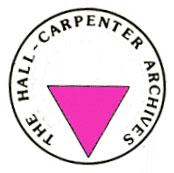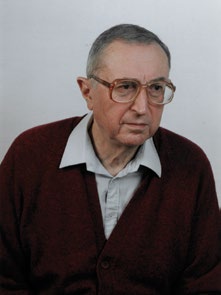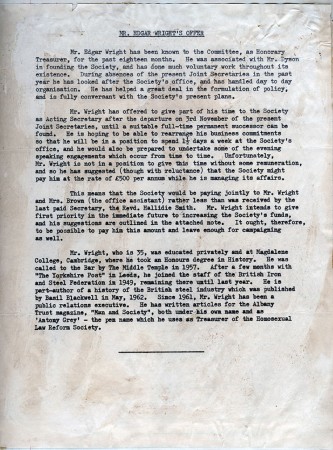 The Hall-Carpenter Archives, named in honour of the lesbian novelist Marguerite Radclyffe Hall and Edward Carpenter, the writer on social and sexual reform, exist to publicise and preserve the records and publications of gay organisations and individuals.
The Hall-Carpenter Archives, named in honour of the lesbian novelist Marguerite Radclyffe Hall and Edward Carpenter, the writer on social and sexual reform, exist to publicise and preserve the records and publications of gay organisations and individuals.
The Hall-Carpenter Archives had their roots in the Gay Monitoring and Archive Project established by the Campaign for Homosexual Equality (CHE) in 1980 with the purpose of scrutinising the media for evidence of discrimination and caring for material deposited with CHE by earlier gay rights organisations. The Gay Monitoring and Archive Project later became separate from CHE, and spent some time in the care of one of its founders, Julian Meldrum, who was employed on a part-time basis by a Manpower Services Commission grant. It was incorporated in 1982 as a limited company under the name of the Hall-Carpenter Memorial Archive Ltd, with a remit of recording and documenting the history of gays and lesbians in Britain. The first Directors were either librarians and information scientists, journalists working for gay publications, or gay rights campaigners interested in maintaining a historical resource.
Charitable status was granted in 1983. During this period the Archives were given office space at the National Council for Civil Liberties. From 1984 to 1989, the Hall-Carpenter Archives were housed in the London Lesbian and Gay Centre, and were staffed mainly by volunteers, who collected archives, journals and ephemera, indexed and sorted press cuttings, wrote publications and ran archival projects. Funding was provided by various grants, most notably from the Greater London Council. GLC funding was withdrawn in 1986, and despite approaches, no replacement funding was available, forcing the Archives to leave the LLGC. They were split into several parts, with the organisational archives, the journals and the ephemera being deposited in the Library of the London School of Economics and Political Science in 1988. The Hall-Carpenter Archives have continued to grow whilst at LSE Library, with new accessions every year, and remain a vital source for the history of lesbian and gay activism. For more information visit: The Hall-Carpenter Archives
Antony Grey, 6 October 1927 – 30 April 2010
 Antony was born Anthony Edgar Gartside Wright in 1927. After graduating with a degree in history from Cambridge University in 1948, he worked briefly as a journalist on The Yorkshire Post before moving to London in 1949 to work first for the British Iron and Steel Federation and later (from 1961) for the London Press Exchange.
Antony was born Anthony Edgar Gartside Wright in 1927. After graduating with a degree in history from Cambridge University in 1948, he worked briefly as a journalist on The Yorkshire Post before moving to London in 1949 to work first for the British Iron and Steel Federation and later (from 1961) for the London Press Exchange.
Antony was one of the earliest voluntary helpers of the Homosexual Law Reform Society (founded 1958) and campaigned tirelessly for the law reforms advocated by the Government-appointed Wolfenden Committee’s report (1957), writing many articles, making numerous speeches to interested groups, lobbying MPs, and organising action to promote the passage of the (Arran/Abse) Sexual Offences Bill through Parliament until it became law in 1967.
This document, taken from first minute book of the HLRS, records his offer in 1962 to take up the secretaryship of the HLRS. The offer was accepted, and Grey remained as secretary first of the HLRS and then of its successor body, the Sexual Law Reform Society, until the 1970s. He also became secretary, and later director, of HLRS’s sister charity, the counselling and research organisation Albany Trust.
Because family reasons made i t impossible to use his own name in the posts, he chose to be known as Antony Grey because of his conviction that there are no entirely black or white issues in life.
t impossible to use his own name in the posts, he chose to be known as Antony Grey because of his conviction that there are no entirely black or white issues in life.
Following his retirement from the Albany Trust in 1977, Antony continued to be involved in counselling and training work, and was for some years a member of the executive committee of the British Association for Counselling. In 1998 he was awarded the Pink Paper Lifetime Achievement Award.
Antony left a substantial archive documenting his life and work, and his papers now form part of the Hall-Carpenter Archives at the Library of the London School of Economics and Political Science.
Letter from Sue Donnelly, Head of Archives and Special Collections
In 1989 I started work as an archivist at LSE. About a month after I arrived the then Archivist took me into one of our storage areas and presented me to the boxes and boxes of the Hall-Carpenter Archives recently transferred from the London Lesbian and Gay Centre. Nothing in my archive training in the mid-1980s or my first professional post cataloguing the papers of the first Duke of Wellington had taught me about the archives of sexuality or alternative archives of any kind. I decided that I would treat them as I would any other collection – I rolled up my sleeves and set about producing a cataloguing. I found myself recording a history that was never taught at school or university. Today the LSE Archive Catalogue has over 8000 records relating to the work of LGBT organisations and individuals.
Since then I found myself learning more and more about LGBT history and activism and become involved in a growing interest in LGBT history across the UK. In the past 20 years more archives have come to light, we’ve developed workshops for students and the public and seen the growth of LGBT history month. Currently the UK Heritage Lottery Fund is supporting a number of oral history projects by LGBT community groups.
For a straight woman with a background in social and political history it has been a fascinating journey I’ve been privileged to take along with many others and I have become convinced that this is a history for everyone.
- Migrating Archives: Participating Archives
- Adarna Food and Culture Restaurant
- The Australian Lesbian and Gay Archives
- The Fonds Suzan Daniel
- GALA
- Gay, Lesbian, Bisexual Transgender Historical Society
- Glasgow Women’s Library
- Hall-Carpenter Archives
- Il Cassero and Centro di Documentazione
- Labrisz Lesbian Association
- The Leslie Lohman Museum
- The National Archives
- rukus!
- Virginia Commonwealth University Libraries